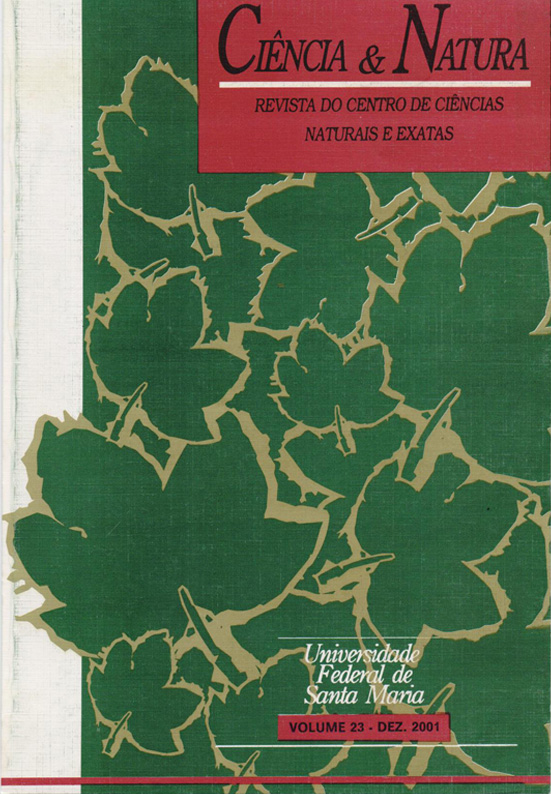Turismo científico em paleontologia no município de Faxinal do Soturno - RS
DOI:
https://doi.org/10.5902/2179460X27127Keywords:
Fossiliferous outcrops, Upper Triassic, Fossil reptiles, Scientific tourism in paleontology.Abstract
This work is based on the survey of fossiliferous outcrops at the Faxinal do Soturno municipality, in order to stimulate the scientific tourism. From this point of view, the dynamics and strategies of the touristic activity were investigated, with a priority in the geographic space (physical, human and economical characters). Due to the geologic and paleontologic characteristics existent at the municipality, the settlement of scientific tourism in paleontology is proposed, as a way of local economic development. A tour route shows the localization of the proper outcrops, its lithology, fossiliferous potentiality, and description of the paleoenvironment. Finally, some infrastructure improvements are recommended.Downloads
References
BARATTO, J. & BARROS SARTORI, G. M. da. Organização do espaço geográfico dos municípios de Faxinal do Soturno e São João do Polêsine - RS. Revista Geografia: Ensino e Pesquisa. Santa Maria: Universidade Federal de Santa Maria, (6-7): 204-228, set. 1994.
BENI, M. C. Análise estrutural do turismo. 2. ed. São Paulo: Editora SENAC. São Paulo, 1998. 427 p.
CAVACO, C. Turismo rural e desenvolvimento local. In: RODRIGUES, A. A. B. (org.). Turismo e Geografia: reflexões teóricas e enfoques regionais. São Paulo: Hucitec, 1996. p. 94-121.
CESCA, O. Faxinal do Soturno: sua história e sua gente. Santa Maria: Rainha, 1975. 188 p.
CORADINI, M. As possibilidades turísticas de Faxinal do Soturno - RS. Santa Maria: Universidade Federal de Santa Maria, CCNE, Departamento de Geociências, 1997. (Trabalho de Graduação A).
CORIOLANO, L. N. M. T. Turismo e degradação ambiental no litoral do Ceará. In: LEMOS, A. (org.), Turismo: impactos sócioambientais. São Paulo: Hucitec, 1996. p. 93-103.
FACCINI, U. F. O Permo-Triássico do Rio Grande do Sul. Uma análise sob o ponto de vista das seqüências deposicionais. Porto Alegre: UFRGS, Curso de Pós-Graduação em Geociências, 1989.133p. (Dissertação de Mestrado)
FUNDAÇÃO DE ECONOMIA E ESTATÍSTICA. Anuário Estatístico do Rio Grande do Sul. Porto Alegre: FEE, 1995.
MAPA GEOLÓGICO DO ESTADO DO RIO GRANDE DO SUL. Escala 1: 1000000. Mapa n.º 8. Outubro, 1974. Instituto de Geociências, Universidade Federal do Rio Grande do Sul, Porto Alegre, Brasil.
MCINTYRE, G. Desenvolvimento de turismo sustentável: manual para organizadores locais. Organização Mundial de Turismo. Publicação de Turismo e Ambiente, 1994. 217 p.
PAGANI, M. I.; SCHIAVETII, A.; MORAES, M. E. B. & TOREZAN, F. H. As trilhas interpretativas da natureza e o ecoturismo. In: LEMOS, A. (Org.). Turismo: impactos sócio ambientais. São Paulo: Hucitec, 1996. p. 151-163.
REJOWSKI, M. Turismo e pesquisa científica: pensamento internacional x situação brasileira. Campinas/São Paulo: Papirus, 1996. 167 p.
RODRIGUES, A. A. B. (Org.). Turismo e geografia: reflexões teóricas e enfoques regionais. São Paulo: Hucitec, 1996. 273 p.
SECRETARIA DE AGRICULTURA E ABASTECIMENTO (SAA). EMBRAPA. Centro Nacional de Pesquisa do Trigo. Macrozoneamento Agroecológico e Econômico do Estado do Rio Grande do Sul. Porto Alegre: SAA/CNPT, v. I, 1994. 307 p.
SERVIÇO NACIONAL DE APRENDIZAGEM COMERCIAL – SENAC. Cursos STCAS. Noções de turismo. Rio Grande do Sul. 1998 a 66 p.
SERVIÇO NACIONAL DE APRENDIZAGEM COMERCIAL – SENAC. Cursos STCAS Geografia aplicada ao turismo. Rio Grande do Sul. 1998b. 26p.
SERVIÇO NACIONAL DE APRENDIZAGEM COMERCIAL – SENAC. Cursos STCAS. Turismo e ecoturismo: teoria e prática. Rio Grande do Sul. 1998c. 62 p.
SERVIÇO NACIONAL DE APRENDIZAGEM COMERCIAL – SENAC. Cursos STCAS Ecoturismo: gestão de projetos. Rio Grande do Sul. 1998d. 37 p.
SILVA, L. L. da. Ecologia: manejo de áreas silvestres. Santa Maria: MMA, FNMA, FATEC, 1996. 352 p.
Downloads
Published
How to Cite
Issue
Section
License
To access the DECLARATION AND TRANSFER OF COPYRIGHT AUTHOR’S DECLARATION AND COPYRIGHT LICENSE click here.
Ethical Guidelines for Journal Publication
The Ciência e Natura journal is committed to ensuring ethics in publication and quality of articles.
Conformance to standards of ethical behavior is therefore expected of all parties involved: Authors, Editors, Reviewers, and the Publisher.
In particular,
Authors: Authors should present an objective discussion of the significance of research work as well as sufficient detail and references to permit others to replicate the experiments. Fraudulent or knowingly inaccurate statements constitute unethical behavior and are unacceptable. Review Articles should also be objective, comprehensive, and accurate accounts of the state of the art. The Authors should ensure that their work is entirely original works, and if the work and/or words of others have been used, this has been appropriately acknowledged. Plagiarism in all its forms constitutes unethical publishing behavior and is unacceptable. Submitting the same manuscript to more than one journal concurrently constitutes unethical publishing behavior and is unacceptable. Authors should not submit articles describing essentially the same research to more than one journal. The corresponding Author should ensure that there is a full consensus of all Co-authors in approving the final version of the paper and its submission for publication.
Editors: Editors should evaluate manuscripts exclusively on the basis of their academic merit. An Editor must not use unpublished information in the editor's own research without the express written consent of the Author. Editors should take reasonable responsive measures when ethical complaints have been presented concerning a submitted manuscript or published paper.
Reviewers: Any manuscripts received for review must be treated as confidential documents. Privileged information or ideas obtained through peer review must be kept confidential and not used for personal advantage. Reviewers should be conducted objectively, and observations should be formulated clearly with supporting arguments, so that Authors can use them for improving the paper. Any selected Reviewer who feels unqualified to review the research reported in a manuscript or knows that its prompt review will be impossible should notify the Editor and excuse himself from the review process. Reviewers should not consider manuscripts in which they have conflicts of interest resulting from competitive, collaborative, or other relationships or connections with any of the authors, companies, or institutions connected to the papers.






